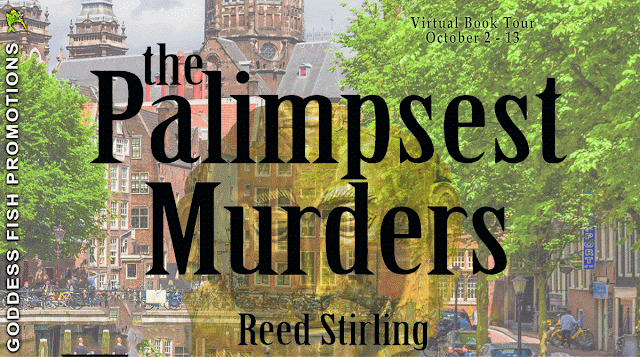The Palimpsest Murders
The Palimpsest Murders
by Reed Stirling
GENRE: Historical mystery
Day one: check-in on the Iphigenia, a Boat & Bike home for thirty guests of diverse backgrounds on a one week excursion through Holland and Belgium. Personalities clash, conflicts arise.
Day seven: a body is found in canal waters at the stern of the boat. On the final morning a second body is discovered.
Who among the cyclists and crew is hateful and motivated enough to kill? Twice. How are the two murders related? Why two coins for the ferryman? Is the phoenix jug, both admired and derided, merely symbolic? How does the death mask of Agamemnon lead to resolution?
Determining truth entails travelling from Amsterdam to Bruges to Paris to the ancient site of Mycenae in Greece where what’s past is shown to be prologue.
Read an Excerpt:
I delved into all the detail, all the different personalities on the Iphigenia and how they clashed from time to time, all the conflicts, minor and major, Mitchell Monk versus Conrad Steele or Virgil Troyes, for instance, Boyd Alexander and his resistance to the pressure of being other than what he was, Alexsis versus the world Kat, her mother, dominated and from which her brother Forrest was banned. Unsettling for guests, I emphasized, the tension a single individual could introduce into a setting of shared expectancy, that individual being no other than Alexsis with whom I sympathized.
I stopped to take a breath. For a moment or two David and Margo registered little more than surprise, then their awe-filled expressions of incredulity filled the void that their silence had left.
Going on, I described Conrad Steele’s corpse lying in a heap on the quay in all its appalling insinuation, and my impression at the time of the absolute zero of being. Did I recognize then a reflection of my own reality? I definitely did and there was nothing I could do to edit out anything extraneous to the hard, cold fact a man I was acquainted with had been brutally murdered. Patricide. The next day revealed a case of matricide. I added what Lucy Hunter and I in Paris concluded after coming to a clearer understanding of the facts. If all the material we had to consider was accurate, then Forrest and Alexsis Troyes literally got away with murder.
About the Author
Reed Stirling lives in Cowichan Bay, BC, and writes when not painting landscapes, travelling, or taking coffee at The Drumroaster, a local café where physics and metaphysics clash daily. Before retiring and taking up writing novels, he taught English Literature. Several talented students of his have gone on to become successful award-winning writers.
He and his wife built a log home in the hills of southern Vancouver Island, and survived totally off the grid for twenty-five years during which time the rooms in that house filled up with books, thousands of student essays were graded, and innumerable cords of firewood were split.
Literary output:
Shades Of Persephone, published in 2019, is a literary mystery set in Greece.
Lighting The Lamp, a fictional memoir, was published in March 2020.
Set in Montreal, Séjour Saint-Louis (2021), dramatizes family conflicts.
The Palimpsest Murders, a European travel mystery, is forthcoming.
Shorter work has appeared over the years in a variety of publications including Dis(s)ent, Danforth Review, Fickle Muses, Fieldstone Review, and Humanist Perspectives.
Intrigue is of primary interest, with romantic entanglement an integral part of the action. Greek mythology plays a significant role in underpinning plots. Allusions to art, literature, philosophy, and religion serve a similar function. Reed sits down to write every day and tries to leave the desk having achieved at least a workable page. Frequently what comes of his effort amounts to no more than a serviceable paragraph, a single sentence, or a metaphor that might work in a context yet to be imagined.
Q&A With the Author
I’d like to take this opportunity to thank Literary Gold for a spot on its blog. Much appreciated, Reed Stirling.
~ You’re quite welcome! Glad to have you here.
Q1. What was your inspiration for writing this book?
A. The book is a novel entitled The Palimpsest Murders, a European Travel Mystery. The plot revolves around thirty or so characters who have embarked on a week-long Boat and Bike excursion through Holland and Belgium. The storyline begins in Amsterdam, continues in Paris, and ends in Greece. During this time, two murders happen in real time and other suspicious deaths are uncovered as part of the backstory. All are reflected in events that echo the classical past. Significantly, the name of the boat is The Iphigenia.
The idea for this novel arose when I took a one-week Boat & Bike excursion through the Lowlands. All was agreeable among the thirty guests onboard. Very enjoyable. But why not, my imagination prompted me, introduce the clash of different personalities in close quarters and have that lead to inevitable conflict that would result in two murders?
My fascination with ancient Greek lore inspired me further. Thus, palimpsest and understanding how the gold death mask of Agamemnon leads to resolution. Determining the truth of the matter entails travelling from Amsterdam to Bruges to Paris to the ancient site of Mycenae in Greece where what’s past is shown to be prologue. Thus, A European Travel Mystery.
The Palimpsest Murders is literary in tone. In some ways it fits the cosy mystery genre but in no way is it all that cosy because it necessitates travel, even in the imaginative sense, and a basic familiarity with characters in Homer’s The Iliad, especially with the royal murders involved in the aftermath to the Trojan War.
Q2. What did you enjoy most about writing this book?
A. The plot of The Palimpsest Murders involves thirty or so very individual characters. What I enjoyed most about writing this novel, aside from determining plot resolution, was deciding what tunes to have salient characters sing in a karaoke session onboard the Iphigenia, tunes that would point them in the direction of either victim or perpetrator. For instance, given his paternal persecution, Boyd Alexander’s rendition of Dylan’s “I Shall Be Released” is virtually symbolic of future action; and Flex’s version of “Mack the Knife,” following shortly after his sudden and unexpected arrival on the boat, is intended to suggest an aggressive side to his seemingly compromised physical stature.
Q3. Do you have any other books you are working on that you can tell us about?
A. At present I am tossing around ideas for a novel I’ve tentatively entitled A Bouquet of Darts. Eros, the Greek god of love and desire will be my narrator. I think he will prove to be the most interesting character among those nudging in attempting to become part of the plot. They are a pushy lot, so they are. He will certainly have a lot to say about himself and the individual characters among them he feels impelled to observe, eavesdrop on, and launch arrows at. Right now he’s sitting on the back burner of creative inspiration getting his wing tips and ass singed. Alas! I think he is pondering how best to deal with the contrariness of his twin Eris, the goddess of strife and disorder. She is his nemesis (pardon the allusion). The setting for this narrative will likely be on a boat where close quarters can create both attraction and repulsion among the guests. Eros has a few tricks in his quiver. Eris will undermine where she sees fit.
Q4. Can you tell us about what you have planned for the future?
A. I plan to see the above-mentioned work in progress through to completion, promote my literary output where best I can, and get back to the easel, brush in one hand and glass of Irish whisky in the other.
Q5. Anything more you would like to say to your readers and fans?
A. I sit down to write every day. I try to come away from the desk having achieved at least a workable page. Frequently what comes of my effort amounts to no more than a paragraph, but one I am satisfied with. Having coffee out or nursing a beer in a pub can lead to observations that connect to themes I’m developing. It could be a bearded face or the shape of a table leg or a tune playing in the background. It could be something grounded in reality close to home.
The most difficult theme I’ve had to deal with comes from a chapter in my novel Lighting the Lamp. It was published in Humanist Perspective (Fall 2019) under the title “Glorious Disorder.” On the one hand, the excerpt deals in a straightforward manner with the nature of metaphysical belief, which can be a very sensitive topic for some readers. On the other hand, my characters have to come to grip with the destructive nature of the Guillain-Barré syndrome. Deeply conflicted about the whys and wherefores of the devastating illness his granddaughter suffers, my protagonist explains that the tragic situation facing the family is not divinely sanctioned but “is simply a disorder arising out of the seeming randomness of the evolutionary process that the cosmos contrived, one that brought us into being, and one that can take us out.”
In reality, my neighbours’ young daughter suffered for months at the hands of this insidious affliction. The whole family was displaced and suffered much. In time, the girl recovered, as does my imagined character.
Links:
https://www.smashwords.com/profile/view/bookswelove
https://authorcentral.amazon.comgp/home
https.//ca.linkedin.com>reed-stirling
Affiliated Authors @ LinkedIn
GIVEAWAY
Reed Stirling will be awarding a $15 Amazon/BN GC to a randomly drawn winner via rafflecopter during the tour.
a Rafflecopter giveaway






We appreciate you featuring this interview today. Thank you.
ReplyDeleteAgreed. Many thanks to Literary Gold for allowing me to guest on this blog.
DeleteThis Historical mystery has a great cover. I enjoyed the Q&A
ReplyDeleteThis story sounds really good. I like the cover.
ReplyDeleteThis looks like a very interesting book.
ReplyDeleteSeems like a cool book.
ReplyDelete